2019
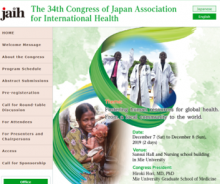
International application of JAGES research sees results
The first results of research to learn from the lessons of the Japan Gerontological Evaluation Study (JAGES) in middle-income countries to promote universal health coverage and health equity were presented at the 34th Congress of the Japan Association for International Health earlier this month.
WKC is supporting this new research where scientists have used information from the experiences in the JAGES’ tool for data collection to measure inequalities in older populations in Malaysia and Myanmar where rapid ageing is taking place.
The results from Myanmar revealed that among the sample of community-dwelling older adults whose blood pressure was measured, 54% were hypertensive, and 37% of these people had never been diagnosed with hypertension. This has significant implications in terms of UHC and access to health services for older people in Myanmar.

Furthermore, the risk of depression among older people tended to be higher in rural areas than in urban areas. Social participation as well as good health and higher socio-economic status were significantly associated with greater happiness. The results pending from Malaysia will provide an interesting comparison to these findings from Myanmar.
JAGES is the largest longitudinal survey of community-dwelling older adults in Japan which aims to understand the causes of health inequalities of older populations. It has successfully engaged with local and national governments to accelerate both the scientific research and the application of evidence to policies and programmes. WKC supported the JAGES project to understand the methods and metrics and how they could be validate elsewhere to impact positively on Universal Health Covearage.
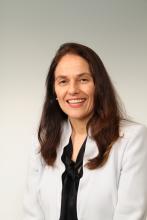
WKC Director’s message for Universal Health Coverage Day, 2019
On 23 September 2019 at the United Nations General Assembly in New York, all UN Member States agreed to a Political Declaration on UHC, signalling strong political commitment to ensuring that all people can receive the health services they need without suffering financial hardship.
Having made the political commitment, policy-makers are now asking reasonable questions about how to deliver on these political commitments. The WHO Centre for Health Development in Kobe (WKC) research helps countries think through these questions and determine the kinds of reforms they need to implement. This is particularly important in the context of megatrends such as population ageing, in which health systems need to change continually and adapt to people’s needs.
WKC research focuses on some of the most vexing problems for policy makers, such as how to ensure sustainable health financing with an ageing population. Recently completed research on price setting and price regulation will help countries of all income levels to do more with the resources they have to improve the quality of health care and financial protection for better health of all.
Achieving UHC in the global context of population ageing requires affordable access to integrated services that are centred on the needs and rights attuned to older people. WKC collaborators are developing a new model of monitoring UHC that addresses essential health services, financial protection and effective coverage of ageing populations.
Investing in health systems is not only an investment in a healthier world, it’s an investment in a safer world. WKC is playing a pivotal role in a new global network to facilitate global action for improving the evidence base in health emergency and disaster risk management, so that countries can make policy decisions grounded in evidence of what works.
On this Universal Health Day, WKC is celebrating health as a human rights issue. Health is a precious commodity, and the basis of human dignity. We will continue to do work that supports countries to progress towards UHC, and equitable, accessible, affordable healthcare for all.
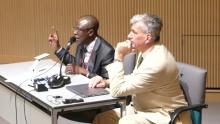
WKC Forum on Accelerating International Research Collaboration for Health-EDRM
WKC hosted a forum on October 18, 2019 on Health Emergency and Disaster Risk Management (Health-EDRM) for local and international stakeholders to discuss how Japan, Hyogo Prefecture, and Kobe can contribute to developing global scientific evidence in this field. In her opening remarks, Dr. Sarah Barber, Director of the WHO Kobe Centre (WKC), highlighted Health-EDRM as one of the major research themes on which WKC and local, national and international research institutes and universities are doing collaborative work.
Representing the Kobe Group, Governor Toshizo Ido recognized the importance of the TPRN core group meeting and WHO and the WKC’s work on disaster risk management, and expressed the wish that the forum be held regularly.
Following presentations by Japanese experts on Health-EDRM policy, research, and response data, the audience discussed Japan’s experience and contributions to Health-EDRM evidence and data.
Dr. Alistair Humphrey, Canterbury District Medical Officer for New Zealand’s Ministry of Health, summarized the findings as follows:
-
Valuable lessons can be shared from Japan’s experiences and standardized data;
-
Japan’s Health-EDRM templates should be shared with other countries so they can collect data more easily during and after disasters;
-
Different approaches should be taken for different disasters; and
-
More dedicated training and education related to Health-EDRM is needed, particularly for students.
In closing, Dr. Ngoy Nsenga, team lead for WHO’s Emergency Programme at the Regional Office for Africa (AFRO), recognized Japan and WHO for promoting Health-EDRM: “Even if I can go home and save one life, then Japan has contributed.”
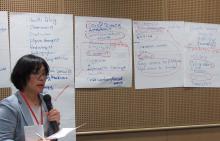
WKC Hosts Global Leaders in Health Emergency and Disaster Risk Management
On October 17, global experts and leaders in health emergency and disaster risk management research (Health-EDRM) from WHO HQ and Regional Offices gathered for the first core group meeting of the WHO Thematic Platform for Health Emergency and Disaster Risk Management Research Network (TPRN). The objective of this meeting was to discuss and agree upon a process to update and finalize the broader Health-EDRM global research agenda.
The participants set a suggested timeframe for follow-on tasks, such as the identification of additional stakeholder candidates and prioritization criteria for research themes. Other steps included the invitation of the additional stakeholders, and a survey of new and old stakeholders to determine Health-EDRM research areas and themes. Once these tasks are completed, the process to further develop the global research agenda is expected to be implemented.
Other outcomes of the meeting included recommendations for TPRN operations and further activities and agreement on the process to build the Health-EDRM Global Research Agenda, which should align with the General Programme of Work (GPW) 13, International Health Regulations (IHR), the WHO Health-EDRM Framework, the Sendai Framework for Disaster Risk Reduction, and other initiatives and programmes.
During the meeting, the World Association for Disaster and Emergency Medicine (WADEM) also announced its collaboration with the WHO TPRN to have a joint follow up session at the 2021 WADEM Congress in Tokyo.
The development of the WHO Guidance on Research Methods for Health-EDRM was announced by TPRN co-chair Professor Virginia Murray. Recognized as a need at the 2018 Health-EDRM expert meeting, the textbook will be released in 2020.
The participants of the first TPRN Core Group Meeting will continue to seek other opportunities to discuss the formulation of the Health-EDRM research agenda with key stakeholders.
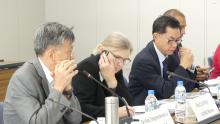
ACWKC Annual Meeting, 7-8 November 2019
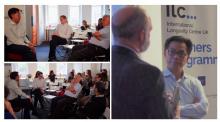
WKC Meets with UK Partners in London to Discuss Research into UHC
Dr Paul Ong, Technical Officer at WKC, recently visited a host of UK based partners to discuss WKC’s research into health services delivery, financing and innovations for UHC in light of the challenges of population aging.
Dr Ong visited the London Secretariat of HelpAge International; University College and King’s College, University of London; The European Observatory on Health Systems and Policy, and the International Longevity Centre (United Kingdom).
Seminars were provided, where Dr. Ong detailed WKC’s research agenda into UHC while also leading lively discussions on the implications that population ageing might have for countries striving to progressively realize UHC. Among the rich discussion, this included debate about how low and middle-income countries could progressively develop their health systems as population ageing occurs, and as significant improvements to communicable diseases, maternal and child health services are realized, leading to increased longevity and a rise in non-communicable diseases. The challenges in developing multi-sectoral continuous care for older people with progressive chronic diseases were also discussed, building on WKC’s research into services delivery models that aim to optimize quality of life and service utilization by this population.
Participants greatly appreciated the opportunity to engage with WKC’s work on UHC. They also gained greater insight into the values that underpin WHO’s drive for UHC well beyond as one participant put it, “merely producing a long shopping list of things that we want for older people or for the many diseases that can afflict this and other populations. We now understand that UHC is values led and evidence-informed and requires a whole of health systems thinking and approach, coupled with careful policy choices, and the building of political will and momentum”.
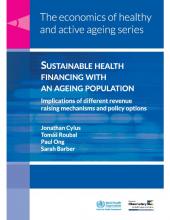
New studies highlight the impact of population ageing on revenues and expenditures for health
WKC and the European Observatory on Health Systems and Policies have completed two new studies to better understand how ageing impacts public revenues and expenditures for health. The research was launched on the sidelines of the G20 Health Ministers’ Summit in Okayama, Japan.
One study examined how countries generate public revenues, since public funding is central to accelerating universal health coverage (UHC). The research found that countries such as Japan with older populations that rely heavily on social contributions (including payroll taxes) to generate revenues face sustainability challenges as more people retire, and such social contributions linked to the labor market decline over time.
Simulations that examined increasing the number of contributors, contribution rate, and diversification of funding found that these options did not fully compensate for the reduction in revenues from social contributions in countries that already have large older populations.
On the other hand, countries with younger populations such as Indonesia have an increased ability to generate revenues from all sources (including income taxes, taxes on goods and services and property taxes), which grow over time as the population ages. This potential gain depends on the efficiency of a country’s tax collection and enforcement mechanisms.
A further study tested the assumption that population ageing will result in unconstrained growth in health spending. Using population projections for the EU, Japan, and Indonesia, the research found that population ageing contributes only modestly to growth of publicly funded healthcare. The researchers applied hypothetical scenarios to explore growth in health expenditures if older people were costlier to care for - for instance, if they used more healthcare, a higher intensity of healthcare, the prices of health care greatly increased, or the benefits expanded considerably.
The study found that population ageing resulted in higher public expenditure growth, but that the increase was moderate and manageable. This implies that population ageing is not, and will not become, the major driver of growth in healthcare spending. Major drivers of growth in health spending are linked to policy choices - including for example, service delivery models, prices of care and new technology.
In conclusion, the studies found that for countries with younger populations, population ageing will positively affect the ability to generate public revenues, and the challenge is to formalize tax collection mechanisms. Countries with larger older populations can partially offset the declines in labor-related contributions through increases in the number of contributors and the contribution rate.
The researchers stress the importance of delinking entitlements to healthcare from the payment of contributions, since relying on social contributions and payroll taxes to finance healthcare is unsustainable as populations age. This is in line with the principles of Universal Health Coverage.
Download the the full reports at https://extranet.who.int/kobe_centre/en/project-details/Sustainable_financing
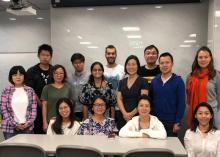
WKC lecture at Kyoto University School of Public Health highlights links between health, education, poverty and the economy
 Kyoto University School of Public Health offers a course on global health. Dr Megumi Rosenberg, WKC Technical Officer, has been a guest lecturer for this course since 2016 to talk about health and its association with education, poverty and the economy, which are commonly known as social determinants of health.
Kyoto University School of Public Health offers a course on global health. Dr Megumi Rosenberg, WKC Technical Officer, has been a guest lecturer for this course since 2016 to talk about health and its association with education, poverty and the economy, which are commonly known as social determinants of health.
On 9 October 2019, Dr Rosenberg spoke to a group of international graduate students who are taking the course this year. The concept of social determinants of health was new to many of them. Dr Rosenberg began by introducing the social determinants of health and how they are mainly responsible for health inequities, the unfair and avoidable differences in health outcomes and opportunities for health seen between and within countries. She then provided a review of the evidence of the links between health, education, poverty and the economy, including some new evidence presented in the European Health Equity Status Report 2019.
The second half of the lecture focused on global initiatives that will contribute to reducing health inequities through action on the social determinants, including relevant WHO Resolutions and the UN Sustainable Development Goals.
The students actively participated in the lecture, sparking discussions about WHO’s global monitoring of action on the social determinants of health and how it is a mechanism for holding Member States accountable for their commitments to act.

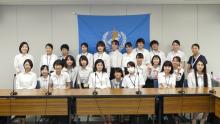
Yamato University Nursing Programme Students Visit WKC
On September 4, WKC technical officer Dr. Megumi Rosenberg welcomed 21 students and two instructors from the Faculty of Allied Health Sciences at Yamato University (Osaka) to WKC to introduce WHO’s mission and current areas of focus.
Dr. Rosenberg’s presentation covered three main topics. She presented an overview of WHO, including its organizational structure, its goals (promote health, keep the world safe, serve the vulnerable) and current focus on the achievement of universal health coverage (UHC). She discussed WKC’s research on health systems and innovations to accelerate progress towards UHC in light of population ageing, including the sharing of knowledge among Japan and other countries.
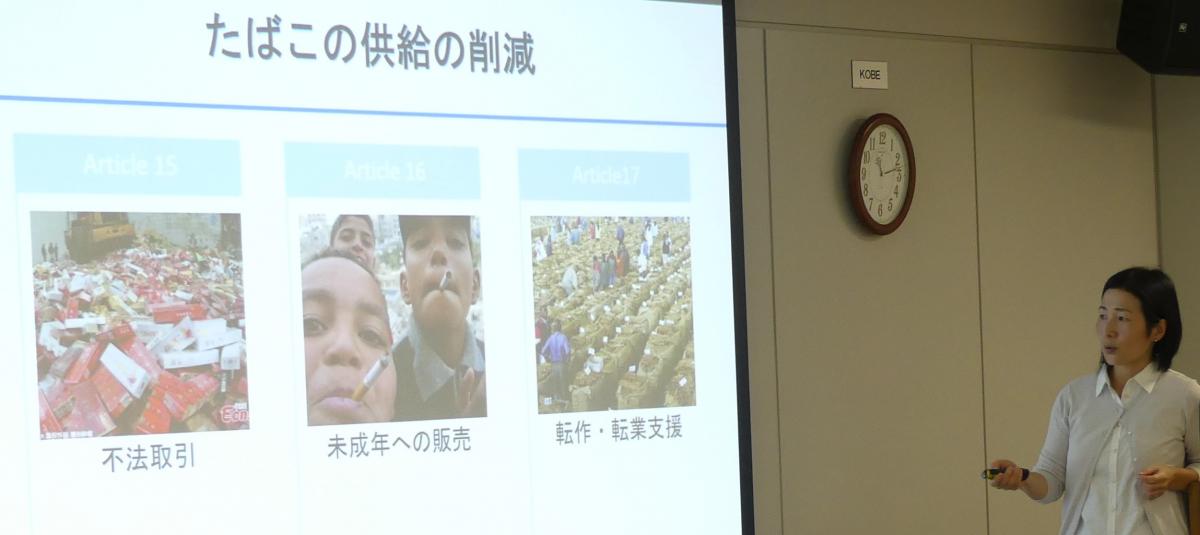
Dr. Rosenberg also shared her own career path and provided a wide range of resources for students interested in global health careers, including opportunities for internships with WHO.
During the Q & A session, the students commented that they furthered their understanding of WKC’s scope of work and became interested in pursuing health care careers globally.
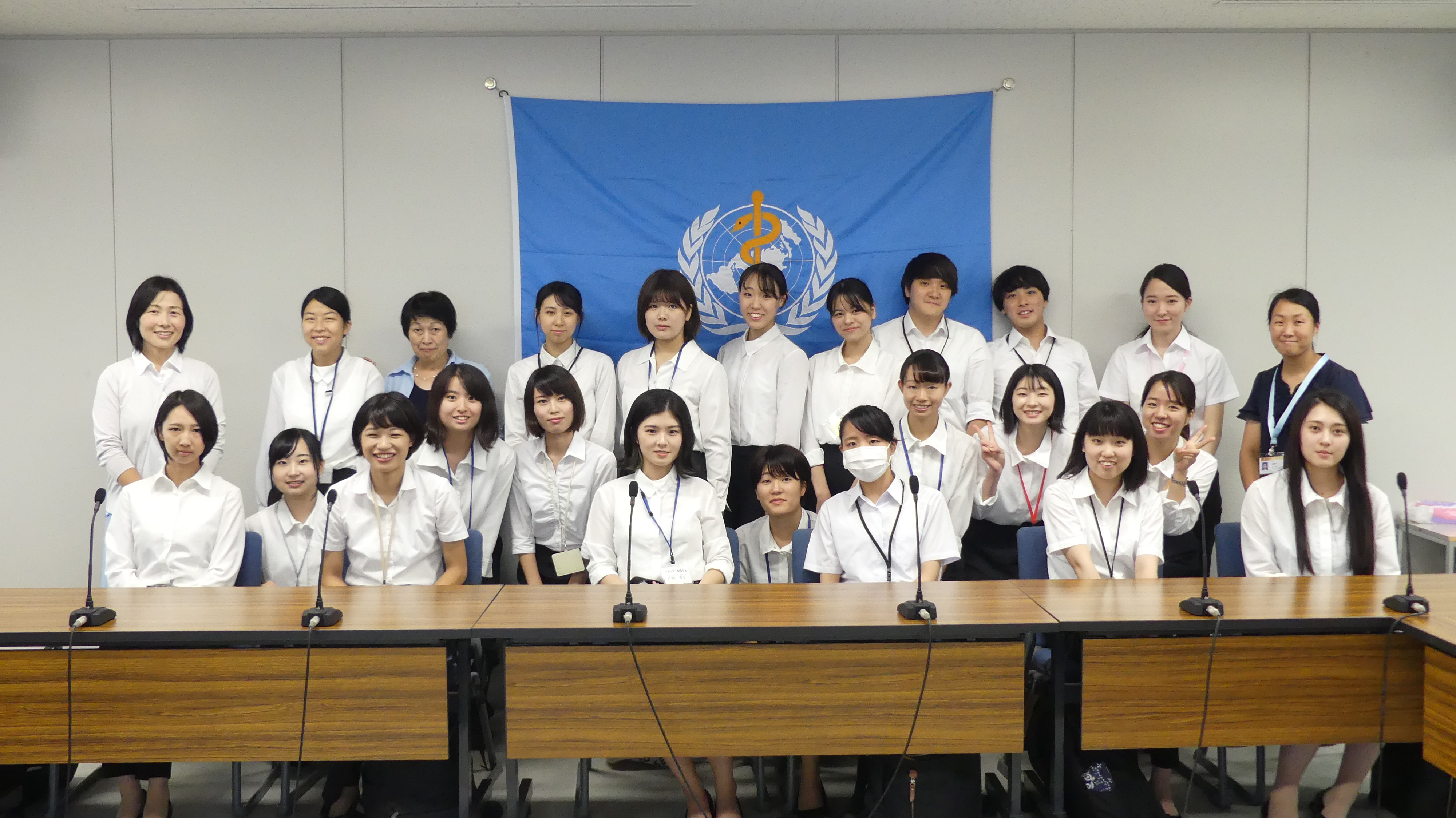
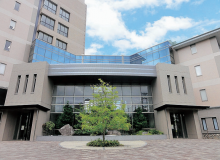
WKC lecture at International Course for Health Sciences Summer Educational Programme by Kobe University
Kobe University organizes the International Course for Health Sciences Summer Educational Programme, an annual educational course for multi-national students.
On Friday, 13 September Dr Ryoma Kayano was invited to give a lecture on global health, WHO and WKC activities. He introduced WHO’s objectives and role in global health, and the current priority areas of WHO and WKC, highlighting the Centre’s three priority research areas to achieve UHC: 1) service delivery 2) metrics and measurement, and 3) health emergency and disaster risk management (Health-EDRM).
He also introduced some research projects in collaboration with Kobe University and other local academia including the Kobe Project for the Exploration of Newer Strategies to Reduce Social Burden of Dementia (a collaborative research initiative with Kobe University) and the global collaboration to develop a guide on research methods for Health-EDRM.

